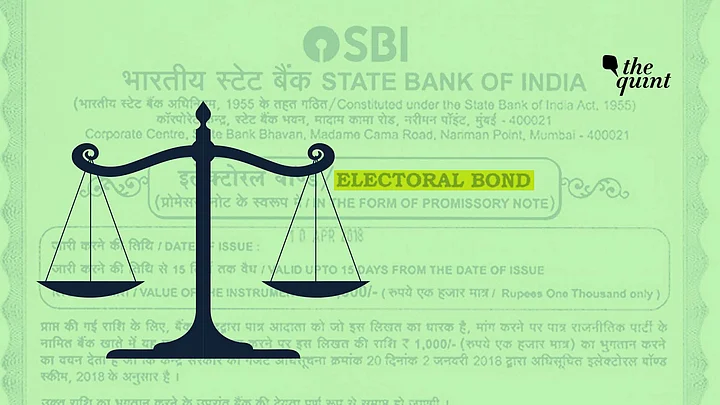In addition to the Reserve Bank of India (RBI) and the Election Commission of India, the Ministry of Law and Justice (MoLJ) had also strongly objected to the issuance of electoral bonds on three grounds, reveals a chain of correspondence with the finance ministry.
First, the finance ministry had issued a notification on 2 January 2018, stating that electoral bonds are promissory notes:
“Electoral bond would be a bearer instrument in the nature of a promissory note and an interest-free banking instrument. A citizen of India or a body incorporated in India will be eligible to purchase the bond.”
The MoLJ objected saying that electoral bonds shouldn’t be sold in the form of a ‘promissory note’ on two grounds: One, an electoral bond doesn’t qualify as a promissory note, and second, it can be used as currency.
Electoral bonds can exchange several hands before they reach their intended target, a political party, as they don’t carry the name of the donor or the receiver.
Second, the finance ministry had proposed that, “Only political parties which obtained no less than 1 percent share of the electoral votes cast in the last Lok Sabha election or any Vidhan Sabha election” would be eligible to receive electoral bonds.
The MoLJ objected to this, saying, “Every political party may accept any amount of contribution voluntarily offered to it by any person or company”.
The law ministry further said that this proposal will not be in sync with Section 29B of The Representation of The People Act, 1951.
Following this, the government, instead of removing the proposal, amended Section 29B of The Representation of The People Act, restricting the benefits of electoral bonds only to a few political parties.
Third, the law ministry also objected to reimbursement of electoral bonds’ expenses by the central government to the SBI. RTI documents reveal that till May 2019, the central government had paid Rs 3.24 crore as commission on the sale of electoral bonds to the public sector bank.
In a file noting, a senior SBI official mentioned that if the cost of the electoral bonds are not reimbursed by the central government, then “the cost may be permitted to be recovered from the purchaser of the bond.”
Experts argue that taxpayers shouldn’t bear the administrative expenses of electoral bonds, rather it should be recovered from the purchaser of the bond.
The above revelations surfaced after The Quint scrutinised government documents received by transparency activist Anjali Bhardwaj.
No Clear Reasoning Behind Resolution of Law Min Objections
A file noting dated 8 December 2017 reveals that Subhash Chandra Garg, the then secretary of Department of Economic Affairs (DEA), accepted MoLJ’s argument saying that, “Purchasing party (of electoral bonds) can indeed transfer it to another party/parties before the bond is handed over to the political party".
The then Finance Minister Arun Jaitley intended to notify and make a statement on electoral bonds in Parliament on 2 January 2018. Considering the shortage of time, on 14 December 2017, Jaitley directed DEA to hold a meeting with the MoLJ to address its concerns.
Accordingly, a meeting was held on 19 December 2017 between the joint secretary of MoLJ and SBI’s law officers, under the chairmanship of Garg, to resolve the objections raised by the law ministry.
The minutes of the 19 December meeting state that MoLJ agreed on using the term “promissory note” for electoral bonds.
They also said that MoLJ had ‘no problem in including 1 percent vote share political parties’ and the net cost of electoral bonds will be ‘borne by the central government’. But the minutes do not explain the evidence or grounds on which MoLJ reversed its objections.
“With my long experience working in power corridors, I am of the opinion that after overruling the EC and the RBI, this is another case of the government pushing its way against the advice of the law ministry.”Commodore Lokesh Batra (Retired), Transparency Activist, to The Quint
Why Electoral Bonds Don’t Qualify as Promissory Notes
“A promissory note is an instrument in writing (not being a banknote or a currency note) containing an unconditional undertaking, signed by the maker, to pay a certain sum of money only to, or to the order of, a certain person, or to the bearer of the instrument,” as per the Negotiable Instrument Act 1881.
The MoLJ pointed out that, “Electoral bond does not qualify to be a promissory note as it is to be endorsed to a specified entity, ie, to a political party only”.
On MoLJ’s objection, the DEA mentioned that SBI is still insisting on using ‘promissory note’ to avoid stamp duty implications. A stamp duty would have required the purchaser to shell out extra money.
In an email to DEA Joint Secretary Prashant Goyal, General Manager Rupee and Global Markets of SBI G Ravindranath said that if electoral bonds are not sold as promissory notes and just as ‘banking instruments’, “the chances of the state government officials to levy stamp duty” cannot be ruled out.
To make the electoral bonds scheme attractive, by not allowing any stamp duty on it, the government overruled the law ministry’s objections.
Every institution involved in the electoral bonds scheme, from RBI to EC to the MoLJ, raised objections to the manner in which the government proposed to introduce the scheme.
But the government either amended laws or overlooked objections to steamroll the electoral bonds scheme, just as they envisaged.
Now, all hopes are pinned on the Supreme Court, which is hearing the petition challenging the electoral bonds scheme. The next hearing is expected in January 2020. The matter was last heard in April 2019.
Click here to access RTI documents on electoral bonds.
